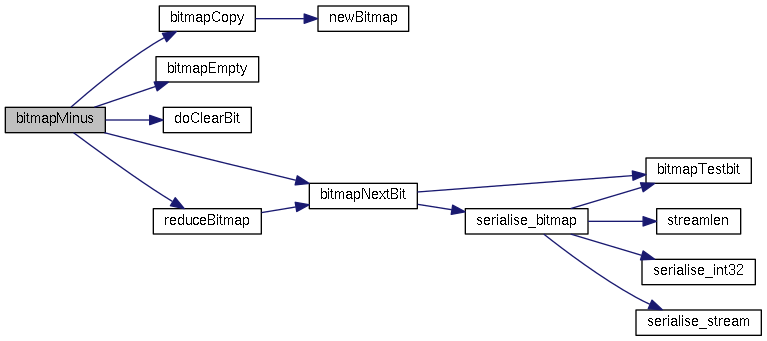Define a bitmap type for postgres. More...
#include "pgbitmap.h"Macros | |
| #define | INT32SIZE_B64 7 |
| #define | INT64SIZE_B64 12 |
Functions | |
| static unsigned | b64_encode (const char *src, unsigned len, char *dst) |
| static unsigned | b64_decode (const char *src, unsigned len, char *dst) |
| static boolean | bitmapEmpty (Bitmap *bitmap) |
| static void | clearBitmap (Bitmap *bitmap) |
| static Bitmap * | newBitmap (int32 min, int32 max) |
| bool | bitmapTestbit (Bitmap *bitmap, int32 bit) |
| Bitmap * | bitmapCopy (Bitmap *bitmap) |
| static Bitmap * | extendBitmap (Bitmap *bitmap, int32 bit) |
| static void | doSetBit (Bitmap *bitmap, int32 bit) |
| static Bitmap * | bitmapSetbit (Bitmap *bitmap, int32 bit) |
| static int32 | bitmapNextBit (Bitmap *bitmap, int32 inbit, bool *found) |
| static char * | serialise_bitmap (Bitmap *bitmap) |
| static void | reduceBitmap (Bitmap *bitmap) |
| static void | doClearBit (Bitmap *bitmap, int32 bit) |
| static Bitmap * | bitmapClearbit (Bitmap *bitmap, int32 bit) |
| static Bitmap * | bitmapSetMin (Bitmap *bitmap, int bitmin) |
| static Bitmap * | bitmapSetMax (Bitmap *bitmap, int bitmax) |
| static bool | bitmapEqual (Bitmap *bitmap1, Bitmap *bitmap2) |
| static Bitmap * | bitmapUnion (Bitmap *bitmap1, Bitmap *bitmap2) |
| static Bitmap * | bitmapIntersect (Bitmap *bitmap1, Bitmap *bitmap2) |
| static Bitmap * | bitmapMinus (Bitmap *bitmap1, Bitmap *bitmap2) |
| static void | serialise_int32 (char **p_stream, int32 value) |
| static int32 | deserialise_int32 (char **p_stream) |
| static void | serialise_stream (char **p_stream, int32 bytes, char *instream) |
| static int | streamlen (int32 bytes) |
| static void | deserialise_stream (char **p_stream, int32 bytes, char *outstream) |
| static Bitmap * | deserialise_bitmap (char *charstream) |
| static int | bitmapCmp (Bitmap *bitmap1, Bitmap *bitmap2) |
| Datum | bitmap_in (FunctionCallInfo fcinfo) |
| Datum | bitmap_out (FunctionCallInfo fcinfo) |
| Datum | bitmap_is_empty (FunctionCallInfo fcinfo) |
| Datum | bitmap_bitmin (FunctionCallInfo fcinfo) |
| Datum | bitmap_bitmax (FunctionCallInfo fcinfo) |
| Datum | bitmap_bits (FunctionCallInfo fcinfo) |
| Datum | bitmap_new_empty (FunctionCallInfo fcinfo) |
| Datum | bitmap_new (FunctionCallInfo fcinfo) |
| Datum | bitmap_setbit (FunctionCallInfo fcinfo) |
| Datum | bitmap_testbit (FunctionCallInfo fcinfo) |
| Datum | bitmap_setmin (FunctionCallInfo fcinfo) |
| Datum | bitmap_setmax (FunctionCallInfo fcinfo) |
| Datum | bitmap_equal (FunctionCallInfo fcinfo) |
| Datum | bitmap_nequal (FunctionCallInfo fcinfo) |
| Datum | bitmap_cmp (FunctionCallInfo fcinfo) |
| Datum | bitmap_lt (FunctionCallInfo fcinfo) |
| Datum | bitmap_le (FunctionCallInfo fcinfo) |
| Datum | bitmap_gt (FunctionCallInfo fcinfo) |
| Datum | bitmap_ge (FunctionCallInfo fcinfo) |
| Datum | bitmap_union (FunctionCallInfo fcinfo) |
| Datum | bitmap_clearbit (FunctionCallInfo fcinfo) |
| Datum | bitmap_intersection (FunctionCallInfo fcinfo) |
| Datum | bitmap_minus (FunctionCallInfo fcinfo) |
Variables | |
| static uint64 | bitmasks [64] |
| static const char | _base64 [] |
| static const short | b64lookup [128] |
Detailed Description
Define a bitmap type for postgres.
Macro Definition Documentation
◆ INT32SIZE_B64
| #define INT32SIZE_B64 7 |
The length of a 64-bit integer as a base64 string. This should really be 8 but the last char is always '=' so we can optimise it away.
◆ INT64SIZE_B64
| #define INT64SIZE_B64 12 |
The length of a 32-bit integer as a base64 string.
Function Documentation
◆ bitmap_bitmax()
| Datum bitmap_bitmax | ( | FunctionCallInfo | fcinfo | ) |
bitmap_bitmax(bitmap bitmap) returns boolean Return the highest bit set in the bitmap, or NULL if none are set. This relies on bitmap->bitmax always identifying the highest numbered bit in the bitset, unless the bitmap is empty.
- Parameters
-
fcinfo Params as described_below
bitmap bitmapThe bitmap being examined.
- Returns
integerThe lowest bit set in the bitmap or NULL if there are no bits set.
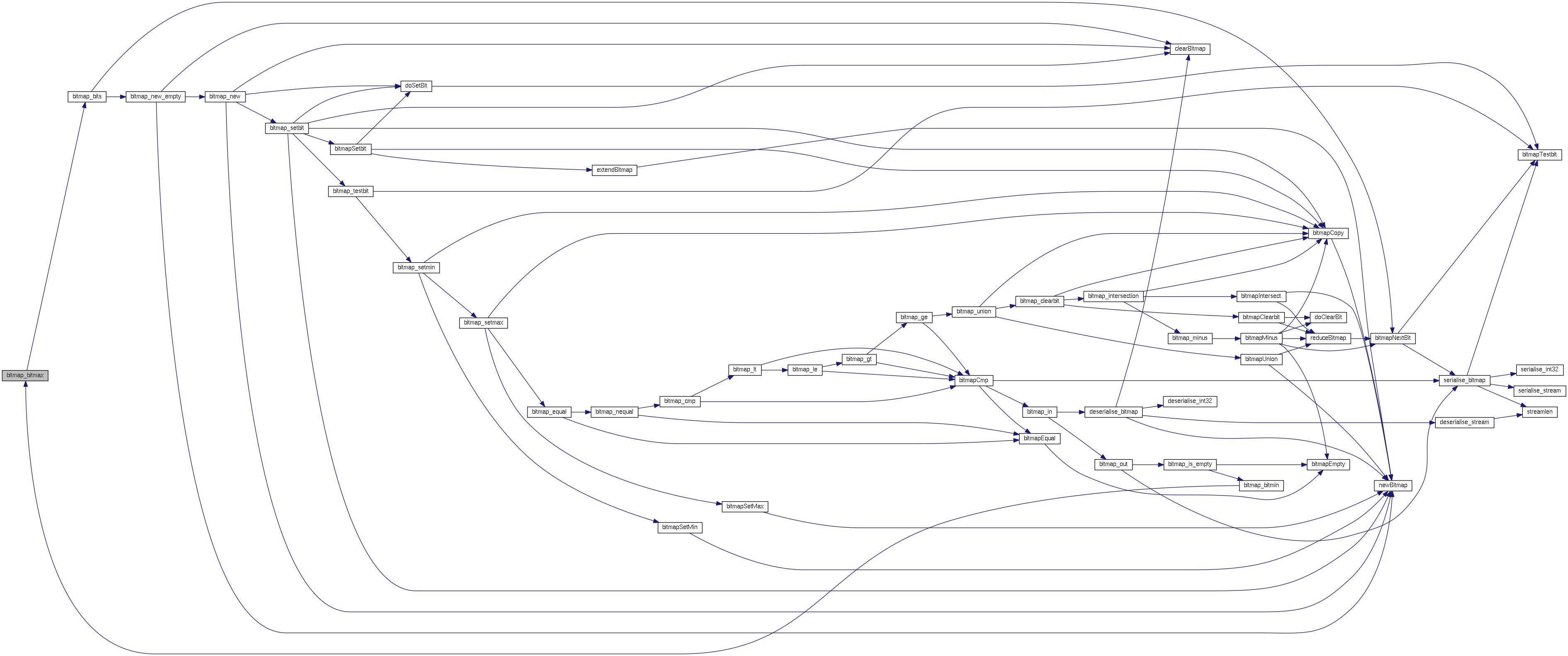
◆ bitmap_bitmin()
| Datum bitmap_bitmin | ( | FunctionCallInfo | fcinfo | ) |
bitmap_bitmin(bitmap bitmap) returns boolean Return the lowest bit set in the bitmap, or NULL if none are set. This relies on bitmap->bitmin always identifying the lowest numbered bit in the bitset, unless the bitmap is empty.
- Parameters
-
fcinfo Params as described_below
bitmap bitmapThe bitmap being examined.
- Returns
integerThe lowest bit set in the bitmap or NULL if there are no bits set.
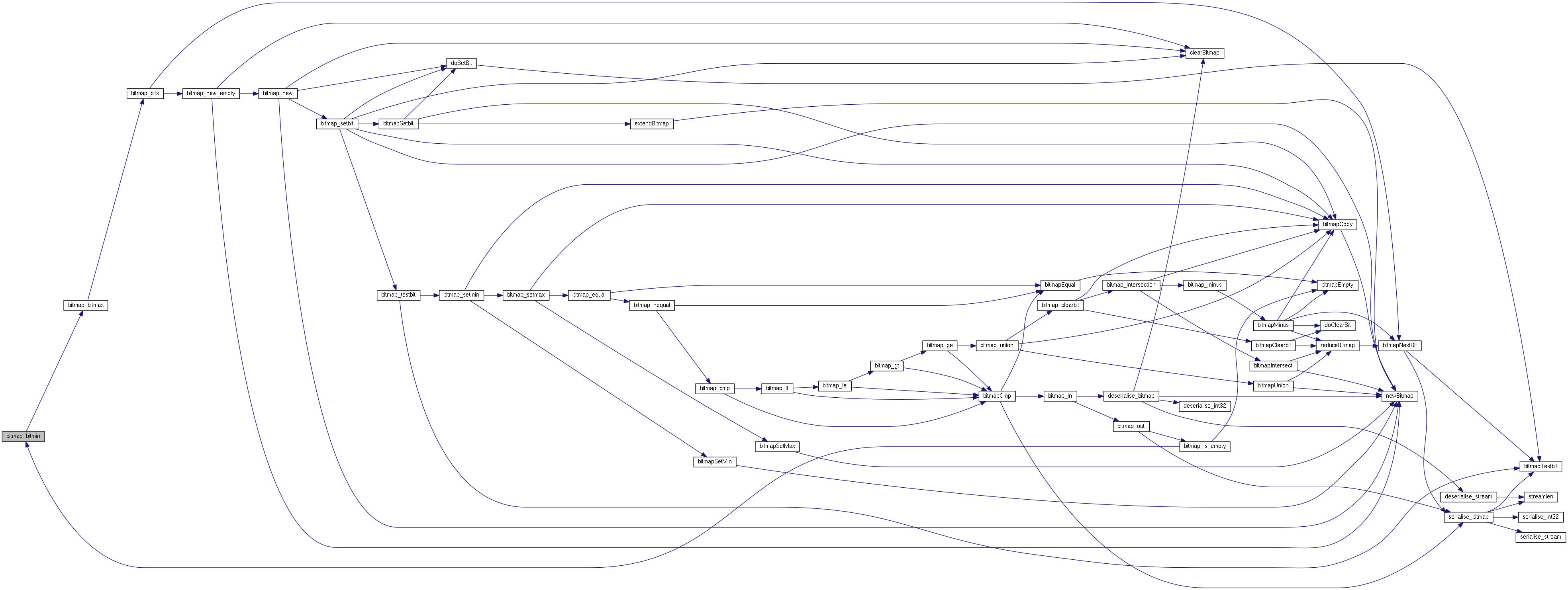
◆ bitmap_bits()
| Datum bitmap_bits | ( | FunctionCallInfo | fcinfo | ) |
bitmap_bits(name text) returns setof int4 Return the set of all bits set in the specified Bitmap.
- Parameters
-
fcinfo name textThe name of the bitmap.
- Returns
setof int4The set of bits that are set in the bitmap.
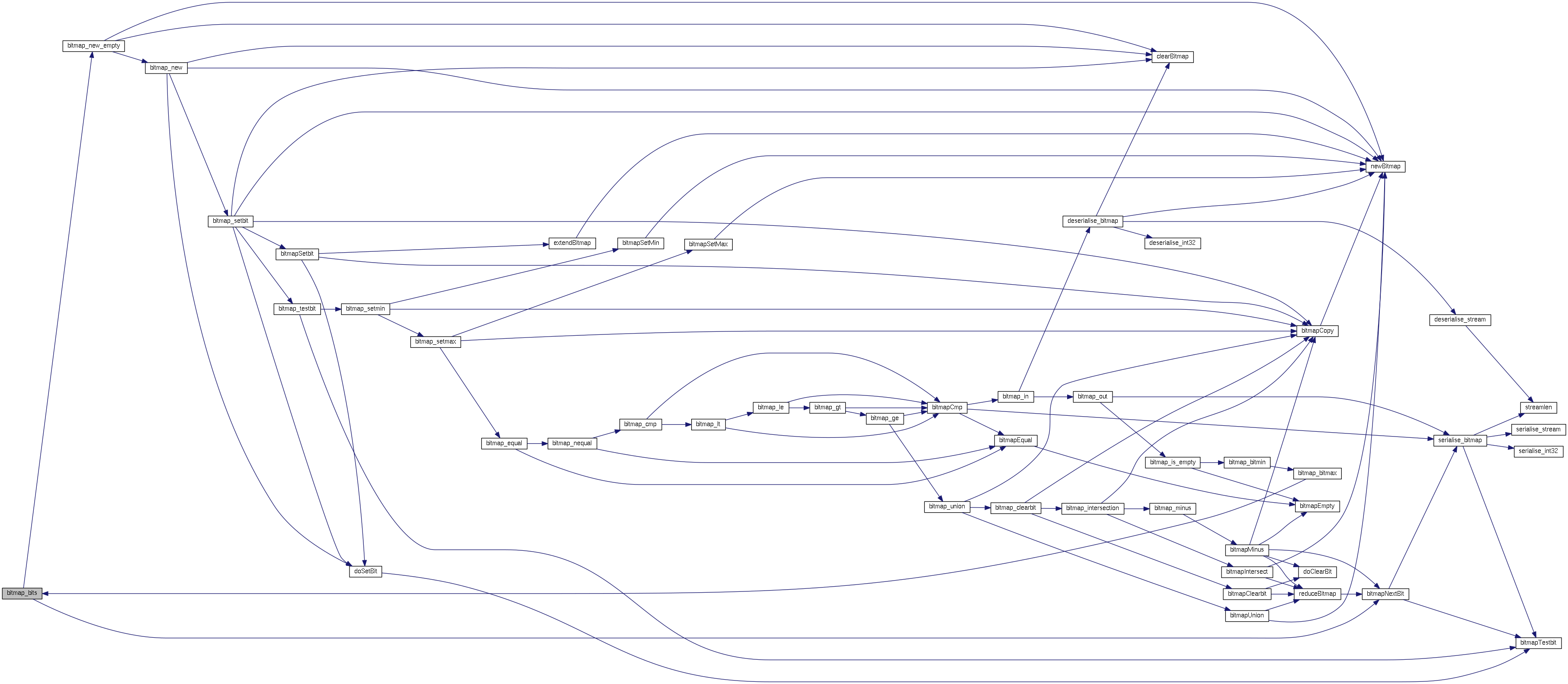
◆ bitmap_clearbit()
| Datum bitmap_clearbit | ( | FunctionCallInfo | fcinfo | ) |
bitmap_clearbit(bitmap bitmap, bit int4) returns bool Clear the given bit in the bitmap, returning FALSE.
- Parameters
-
fcinfo Params as described_below
bitmap bitmapThe bitmap to be manipulated.
bitno int4The bitnumber to be set.
- Returns
boolTRUE

◆ bitmap_cmp()
| Datum bitmap_cmp | ( | FunctionCallInfo | fcinfo | ) |
bitmap_cmp(bitmap1 bitmap, bitmap2 bitmap) returns bool Return result of comparison of bitmap1's string representation with bitmap2's.
- Parameters
-
fcinfo Params as described_below
bitmap1 bitmapThe first bitmap
bitmap2 bitmapThe second bitmap
- Returns
int4result of comparison
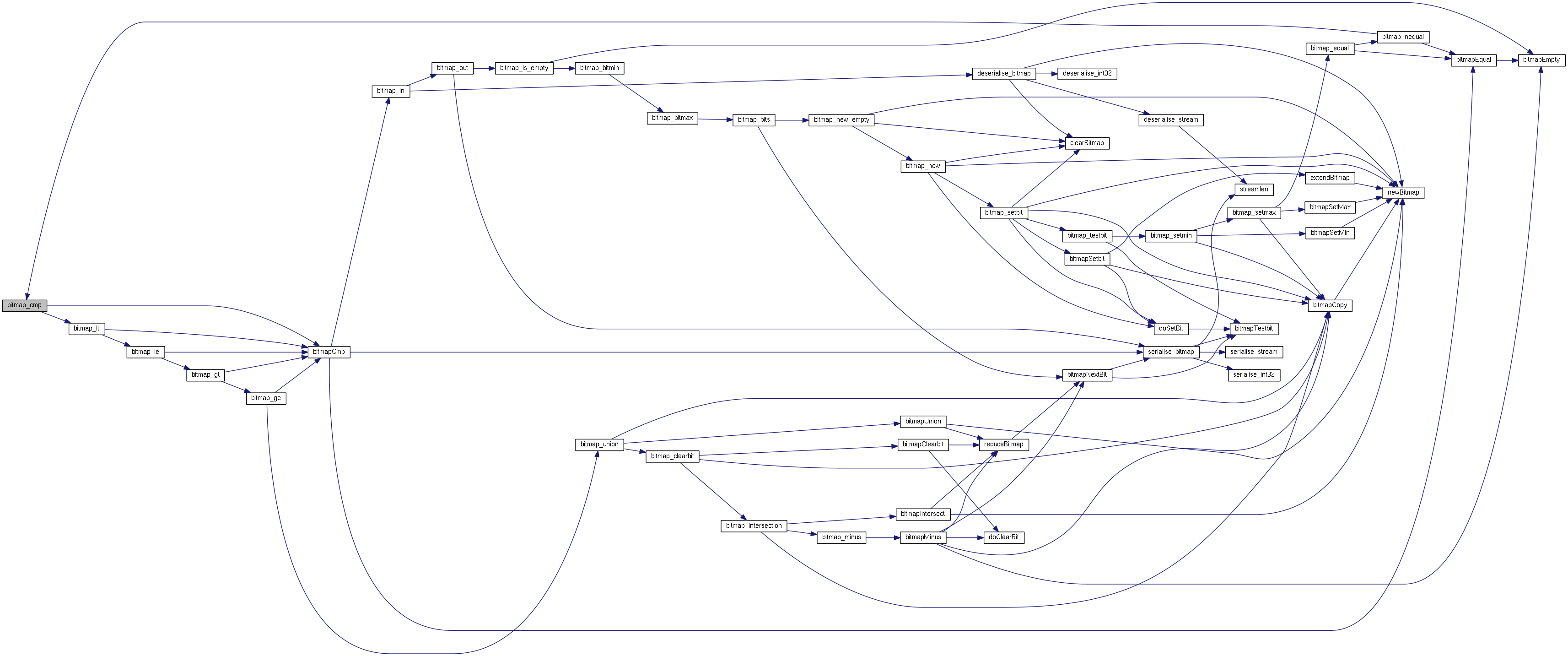
◆ bitmap_equal()
| Datum bitmap_equal | ( | FunctionCallInfo | fcinfo | ) |
bitmap_equal(bitmap1 bitmap, bitmap2 bitmap) returns bool Return true if the bitmaps are equivalent,
- Parameters
-
fcinfo Params as described_below
bitmap1 bitmapThe first bitmap
bitmap2 bitmapThe second bitmap
- Returns
booltrue if the bitmaps contain the same bits.
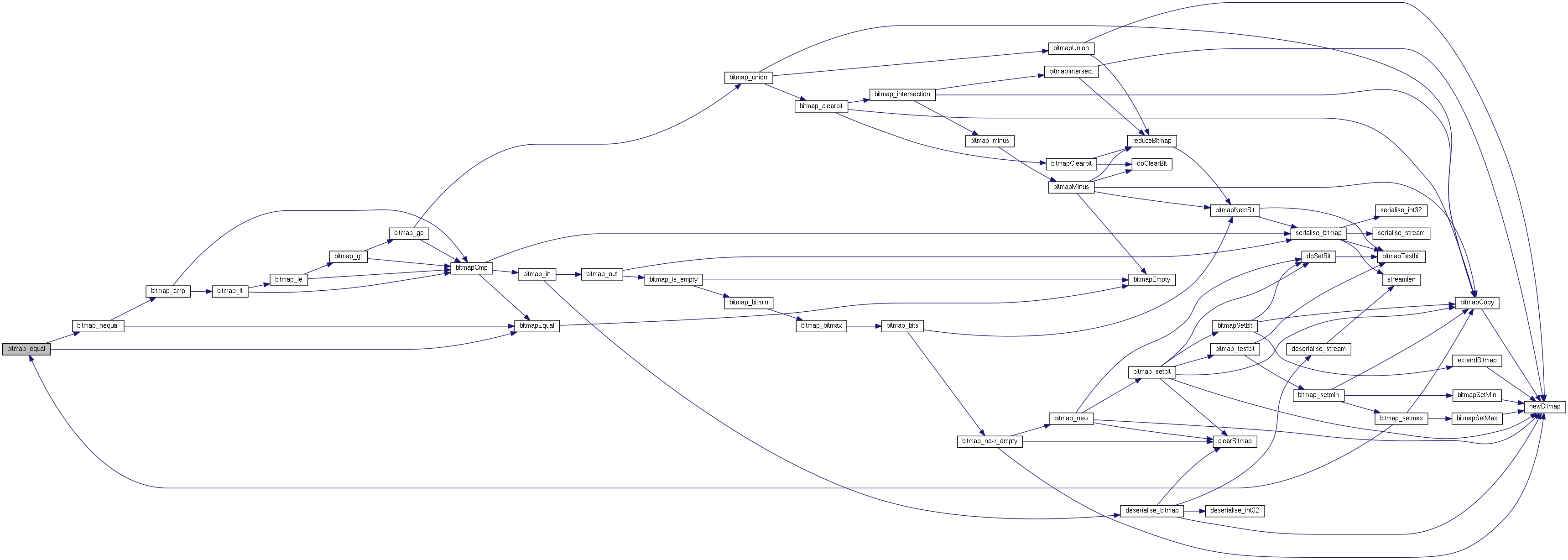
◆ bitmap_ge()
| Datum bitmap_ge | ( | FunctionCallInfo | fcinfo | ) |
bitmap_ge(bitmap1 bitmap, bitmap2 bitmap) returns bool Return true if bitmap1's string representation should be sorted later than, or the same as, bitmap2's.
- Parameters
-
fcinfo Params as described_below
bitmap1 bitmapThe first bitmap
bitmap2 bitmapThe second bitmap
- Returns
booltrue unless the bitmaps contain the same bits.
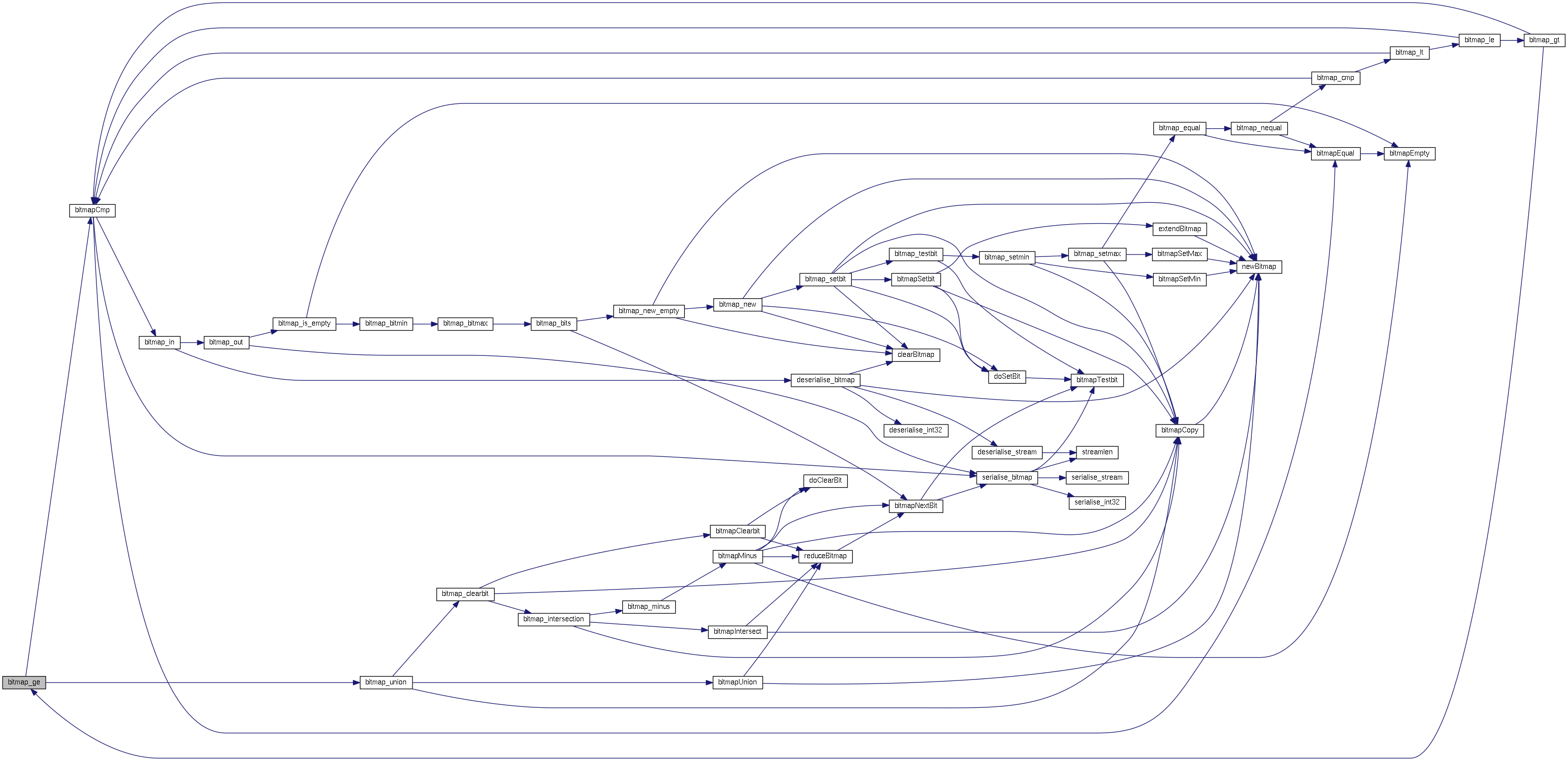
◆ bitmap_gt()
| Datum bitmap_gt | ( | FunctionCallInfo | fcinfo | ) |
bitmap_gt(bitmap1 bitmap, bitmap2 bitmap) returns bool Return true if bitmap1's string representation should be sorted later than bitmap2's.
- Parameters
-
fcinfo Params as described_below
bitmap1 bitmapThe first bitmap
bitmap2 bitmapThe second bitmap
- Returns
booltrue unless the bitmaps contain the same bits.
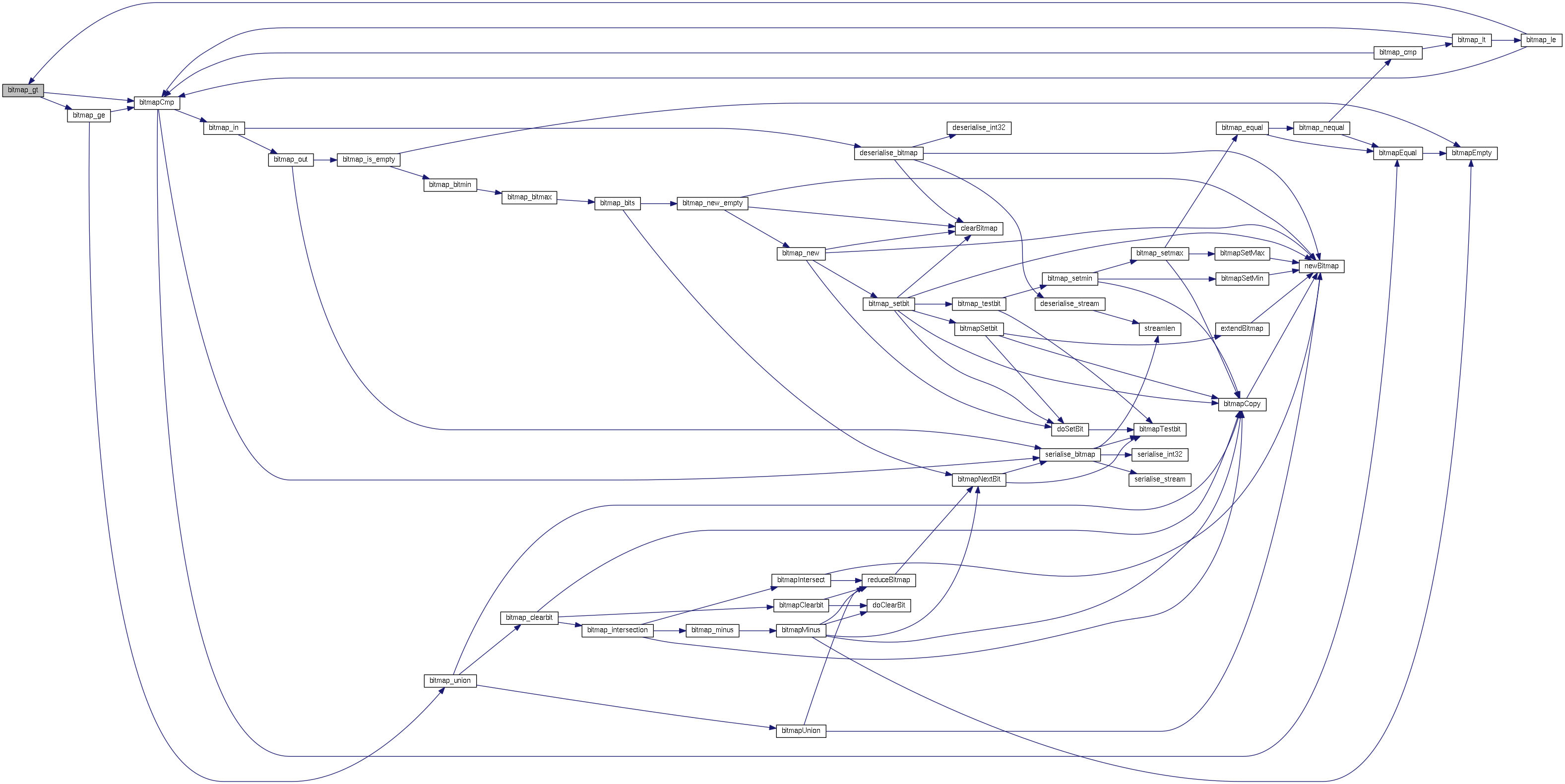
◆ bitmap_in()
| Datum bitmap_in | ( | FunctionCallInfo | fcinfo | ) |
◆ bitmap_intersection()
| Datum bitmap_intersection | ( | FunctionCallInfo | fcinfo | ) |
bitmap_intersection(bitmap1 bitmap, bitmap2 bitmap) returns bitmap Return the intersection of 2 bitmaps. This can be used as an aggregate function in which case the bitmap1 parameter will be null for the first call. In this case simply return the second argument.
- Parameters
-
fcinfo Params as described_below
bitmap1 bitmapThe first bitmap
bitmap2 bitmapThe second bitmap
- Returns
bitmapthe intersection of the two bitmaps.

◆ bitmap_is_empty()
| Datum bitmap_is_empty | ( | FunctionCallInfo | fcinfo | ) |
bitmap_is_empty(bitmap bitmap) returns boolean Predicate to identify whether a bitmap is empty or not.
- Parameters
-
fcinfo Params as described_below
bitmap bitmapThe bitmap being examined. bitmap value.
- Returns
booleantrue, if the bitmap has no bits.
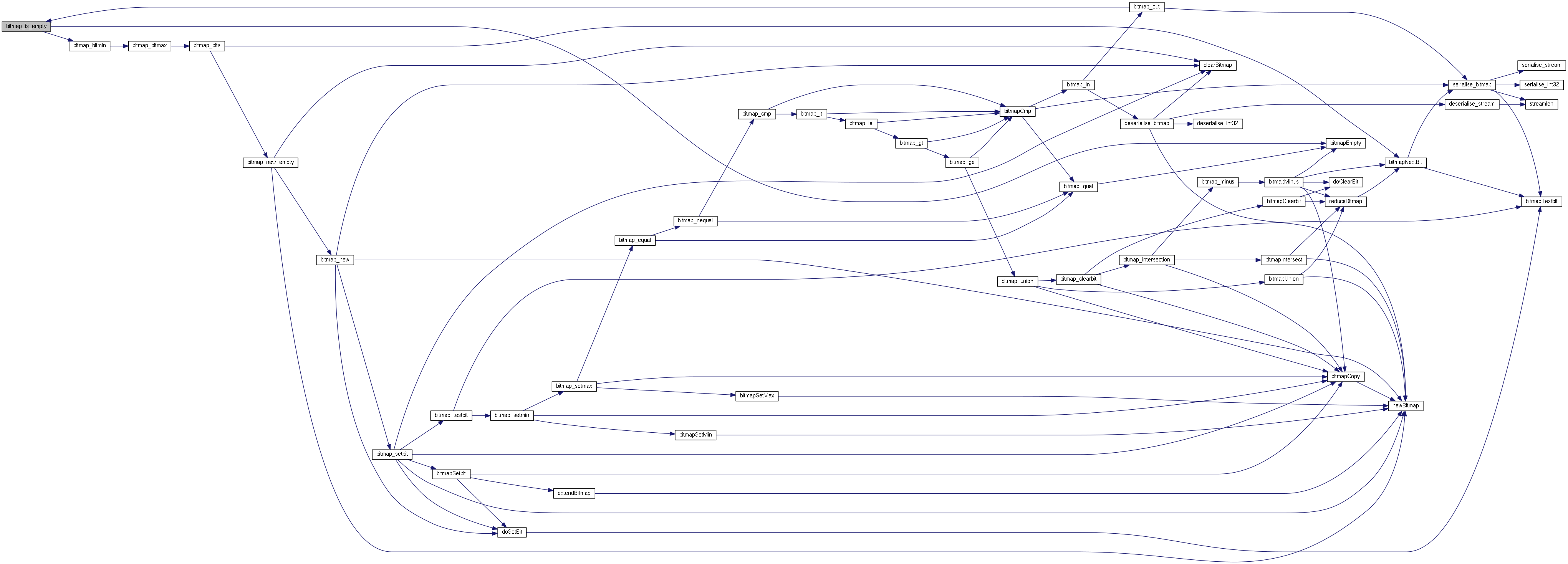
◆ bitmap_le()
| Datum bitmap_le | ( | FunctionCallInfo | fcinfo | ) |
bitmap_le(bitmap1 bitmap, bitmap2 bitmap) returns bool Return true if bitmap1's string representation should be sorted earlier than, or the same as, bitmap2's.
- Parameters
-
fcinfo Params as described_below
bitmap1 bitmapThe first bitmap
bitmap2 bitmapThe second bitmap
- Returns
booltrue unless the bitmaps contain the same bits.
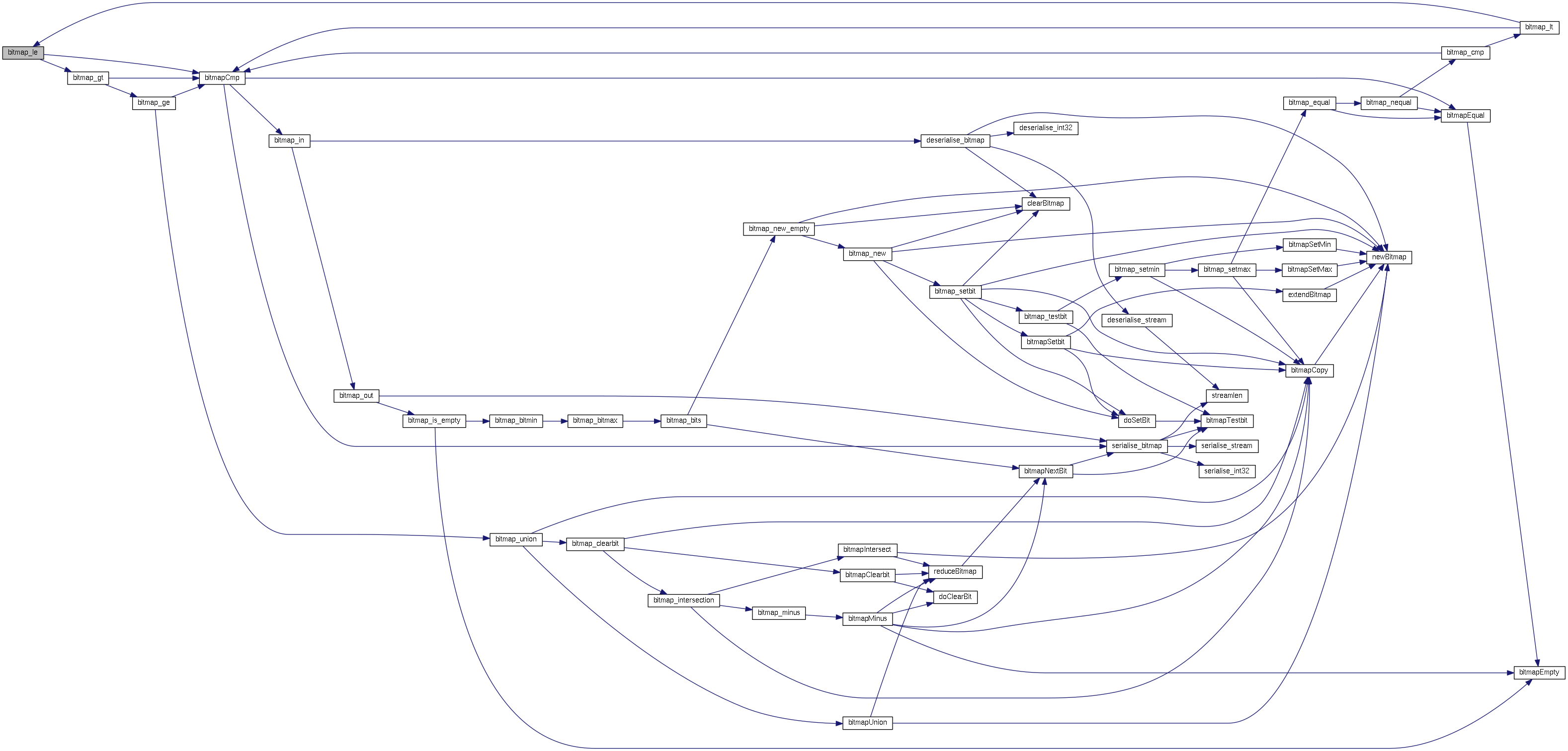
◆ bitmap_lt()
| Datum bitmap_lt | ( | FunctionCallInfo | fcinfo | ) |
bitmap_lt(bitmap1 bitmap, bitmap2 bitmap) returns bool Return true if bitmap1's string representation should be sorted earlier than bitmap2's.
- Parameters
-
fcinfo Params as described_below
bitmap1 bitmapThe first bitmap
bitmap2 bitmapThe second bitmap
- Returns
booltrue unless the bitmaps contain the same bits.
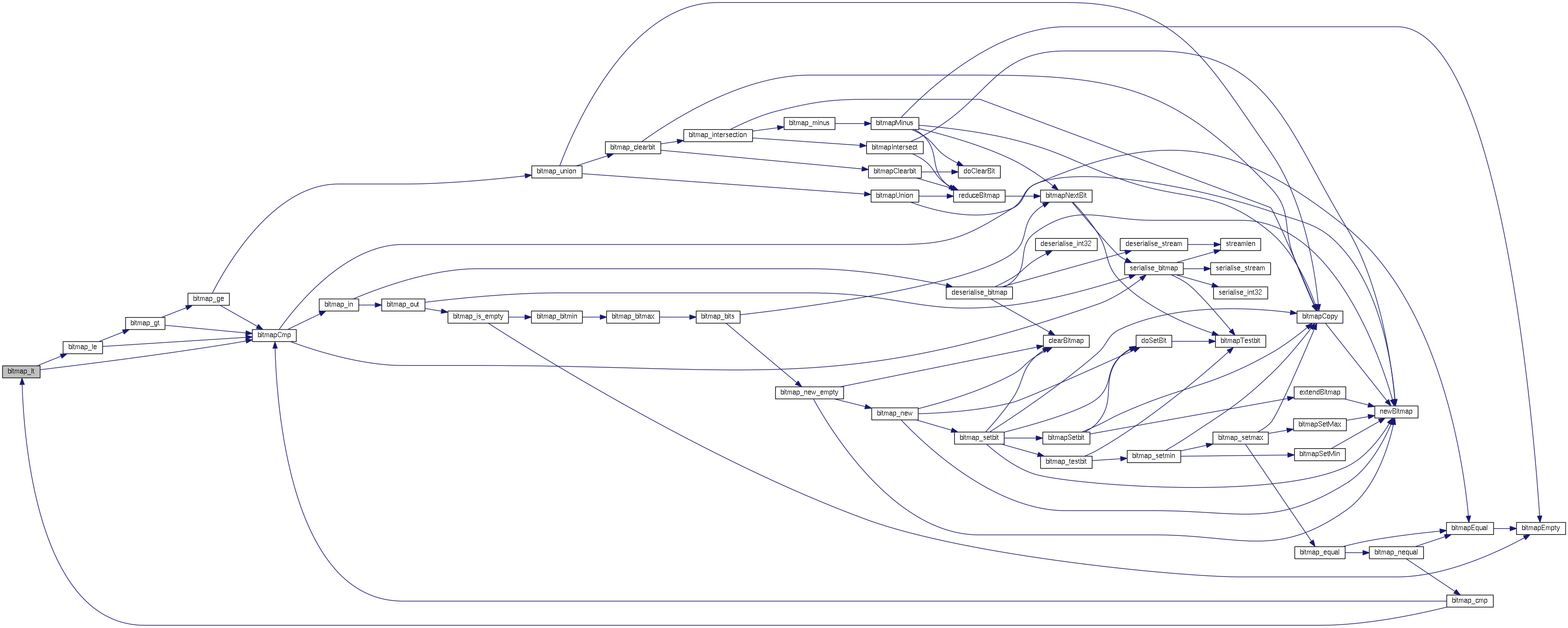
◆ bitmap_minus()
| Datum bitmap_minus | ( | FunctionCallInfo | fcinfo | ) |
bitmap_minus(bitmap1 bitmap, bitmap2 bitmap) returns bitmap Return the bitmap1 with all bits from bitmap2 subtracted (cleared) from it.
- Parameters
-
fcinfo Params as described_below
bitmap1 bitmapThe first bitmap
bitmap2 bitmapThe second bitmap
- Returns
bitmapthe subtraction of the two bitmaps.
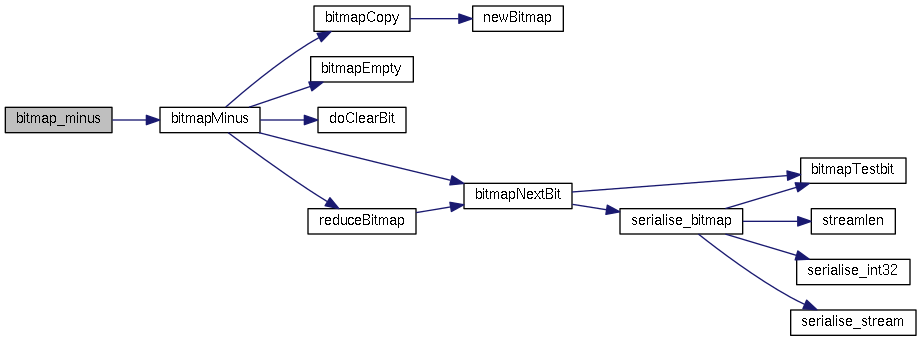
◆ bitmap_nequal()
| Datum bitmap_nequal | ( | FunctionCallInfo | fcinfo | ) |
bitmap_nequal(bitmap1 bitmap, bitmap2 bitmap) returns bool Return true if the bitmaps are not equivalent,
- Parameters
-
fcinfo Params as described_below
bitmap1 bitmapThe first bitmap
bitmap2 bitmapThe second bitmap
- Returns
booltrue unless the bitmaps contain the same bits.
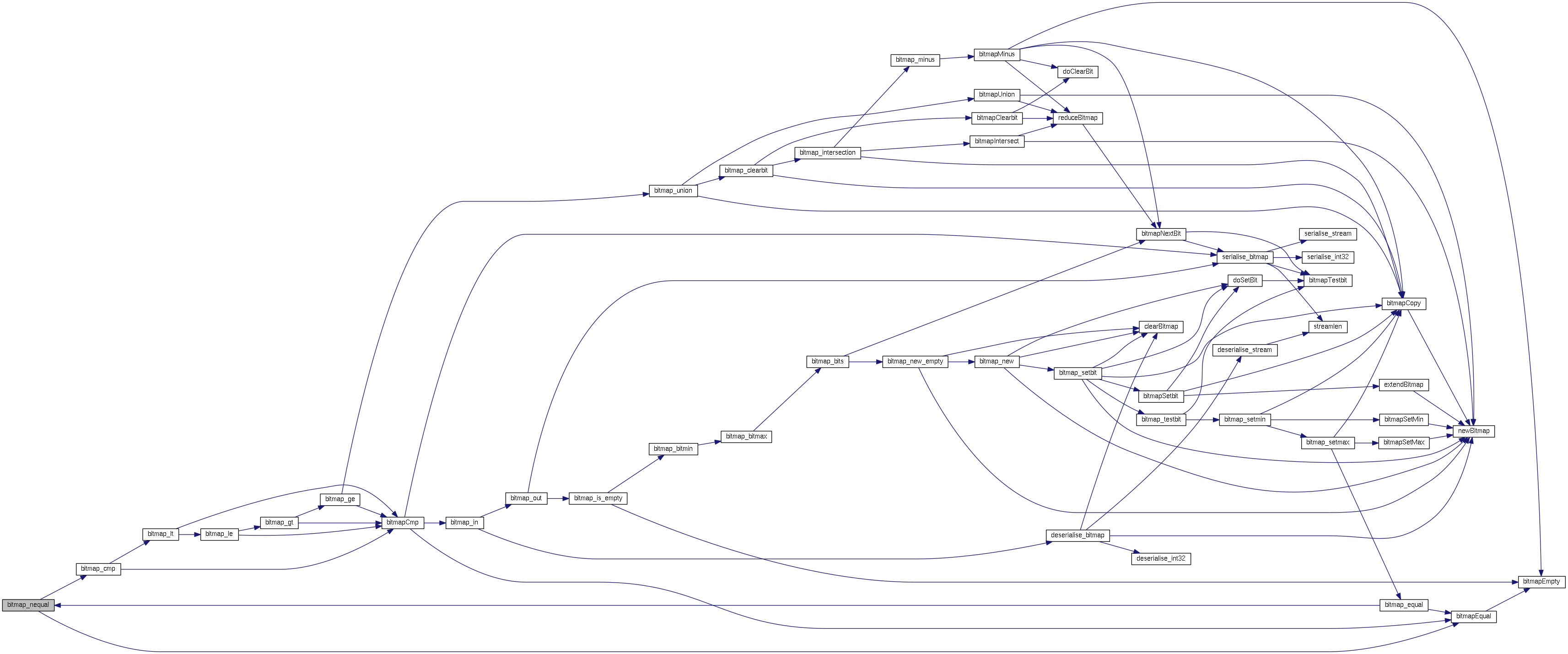
◆ bitmap_new()
| Datum bitmap_new | ( | FunctionCallInfo | fcinfo | ) |
bitmap_new() returns bitmap; Create or re-initialise a Bitmap, for dealing with a named range of values.
- Parameters
-
fcinfo Params as described_below
bitno int32The first integer value to be recorded in the bitmap
- Returns
Bitmapthe newly allocated bitmap
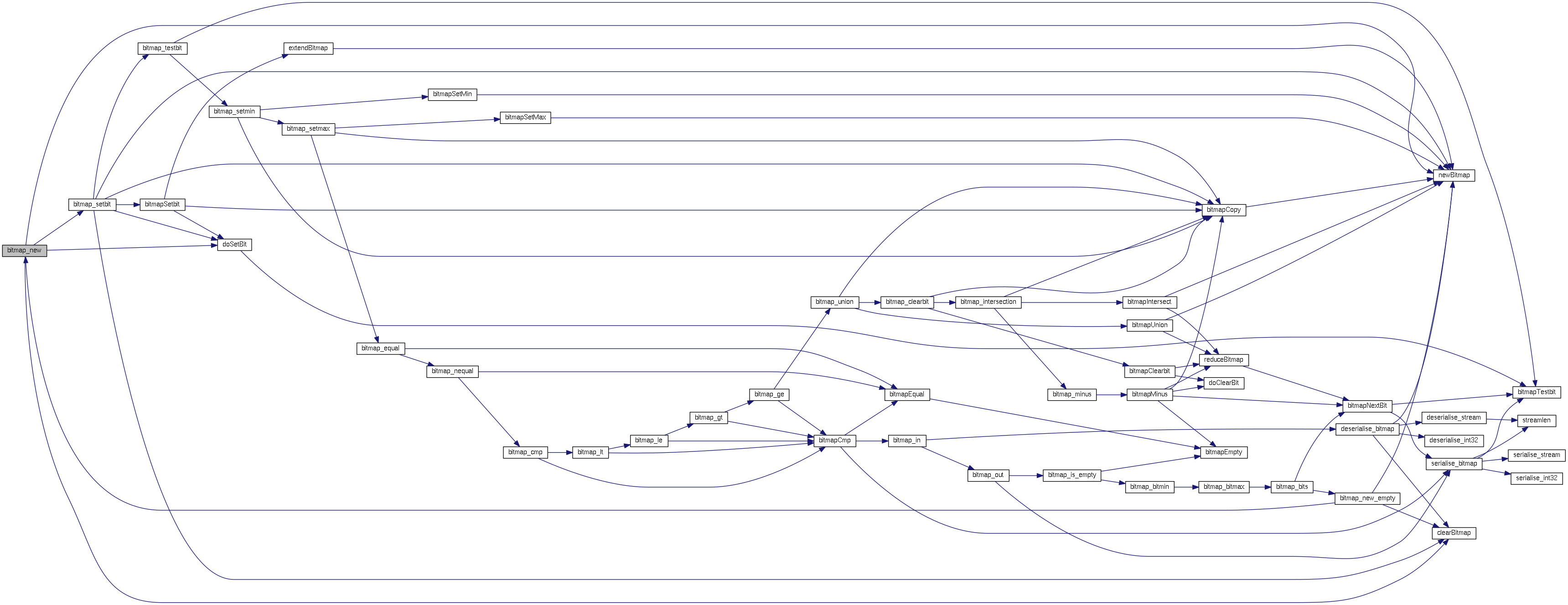
◆ bitmap_new_empty()
| Datum bitmap_new_empty | ( | FunctionCallInfo | fcinfo | ) |
bitmap_new_empty() returns bitmap; Create an empty Bitmap, for dealing with a named range of values.
- Parameters
-
fcinfo Params as described_below
- Returns
Bitmapthe newly allocated bitmap
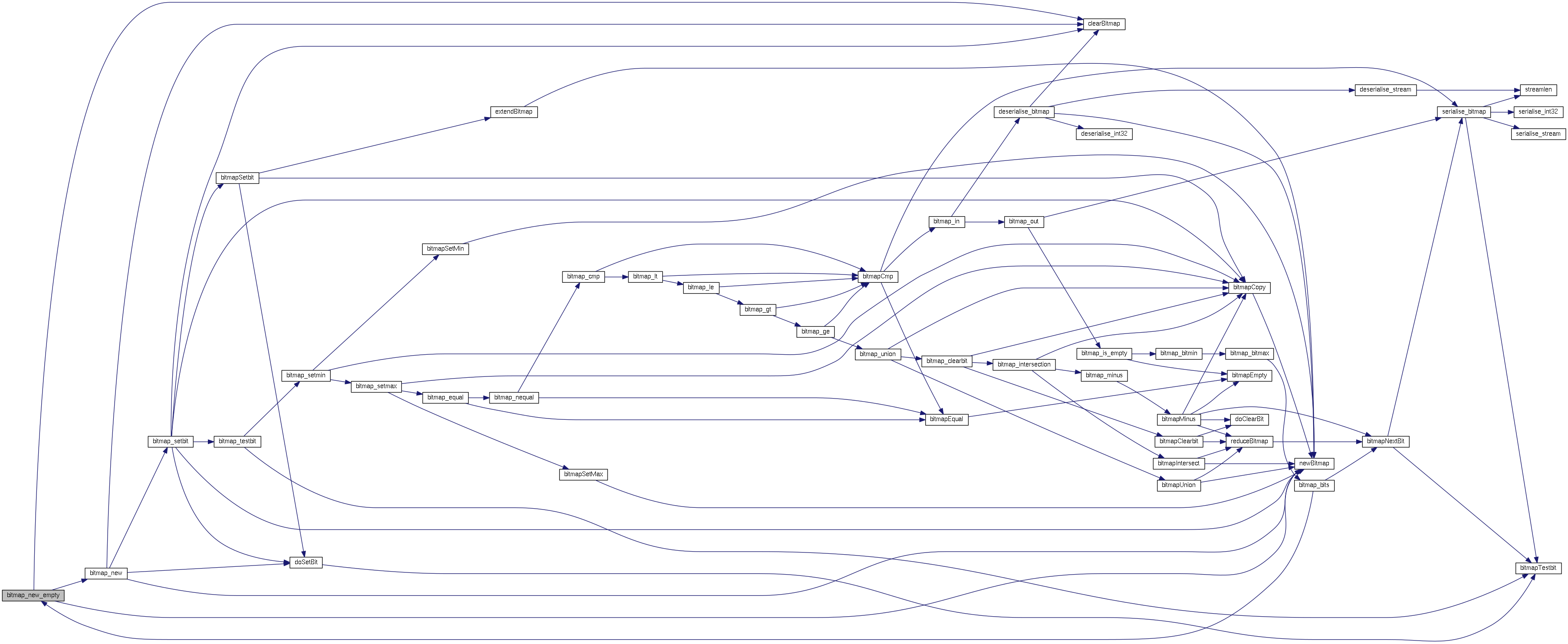
◆ bitmap_out()
| Datum bitmap_out | ( | FunctionCallInfo | fcinfo | ) |
bitmap_out(bitmap bitmap) returns text Create a (base64) text representation of a bitmap.
- Parameters
-
fcinfo Params as described_below
bitmap bitmapA base64 serialiastion of a bitmap value.
- Returns
cstringthe newly serialised text stream.

◆ bitmap_setbit()
| Datum bitmap_setbit | ( | FunctionCallInfo | fcinfo | ) |
bitmap_setbit(bitmap bitmap, bit int4) returns bool Set the given bit in the bitmap, returning TRUE. This can be used as an aggregate function in which case the bitmap parameter will be null for the first call. In this case simply create a bitmap from the second argument.
- Parameters
-
fcinfo Params as described_below
bitmap bitmapThe bitmap to be manipulated.
bitno int4The bitnumber to be set.
- Returns
bitmapThe result.
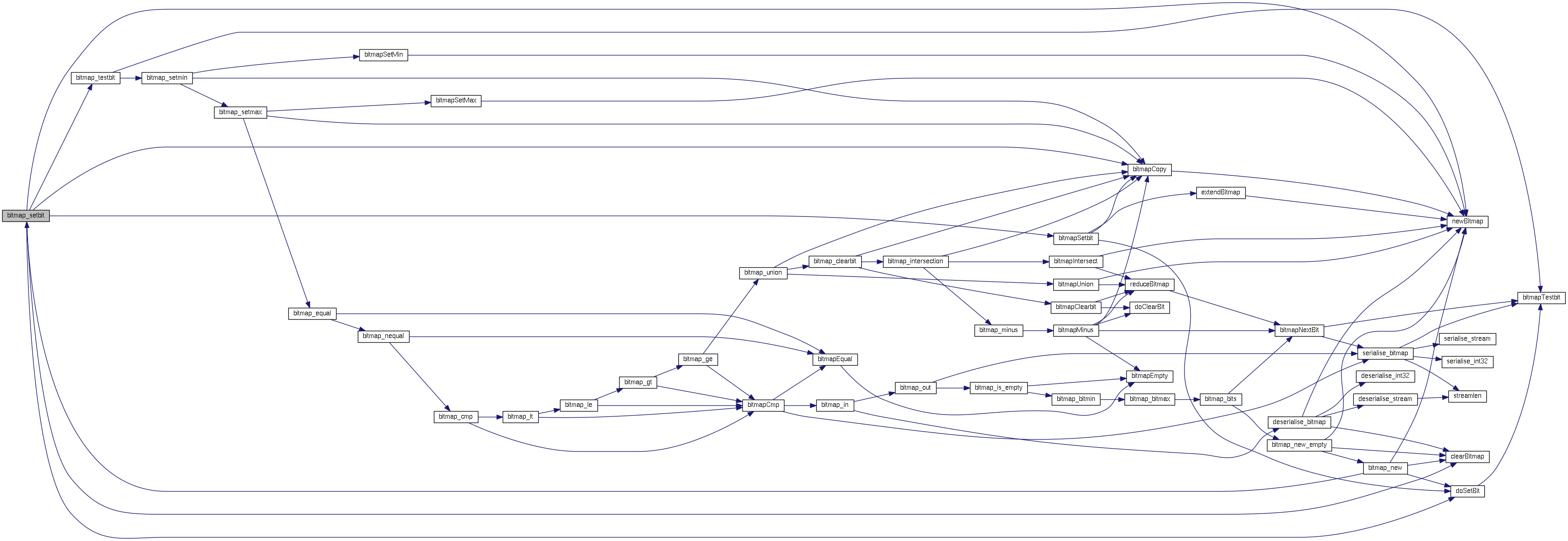
◆ bitmap_setmax()
| Datum bitmap_setmax | ( | FunctionCallInfo | fcinfo | ) |
bitmap_setmax(bitmap bitmap, bitmax int4) returns bitmap Return a new bitmap having no bits greater than bitmax
- Parameters
-
fcinfo Params as described_below
bitmap bitmapThe bitmap to be manipulated.
bitmax int4The new maximum bit.
- Returns
bitmapThe new bitmap.
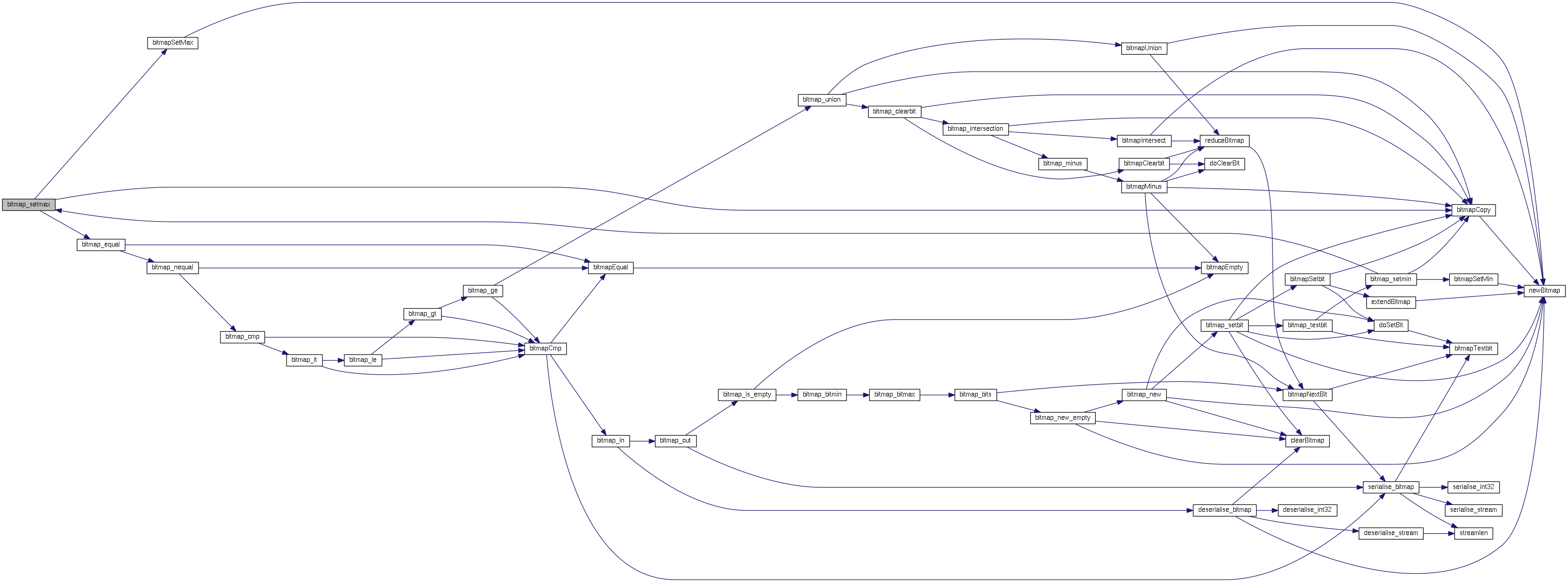
◆ bitmap_setmin()
| Datum bitmap_setmin | ( | FunctionCallInfo | fcinfo | ) |
bitmap_setmin(bitmap bitmap, bitmin int4) returns bitmap Return a new bitmap having no bits less than bitmin
- Parameters
-
fcinfo Params as described_below
bitmap bitmapThe bitmap to be manipulated.
bitmin int4The new minimum bit.
- Returns
bitmapThe new bitmap.
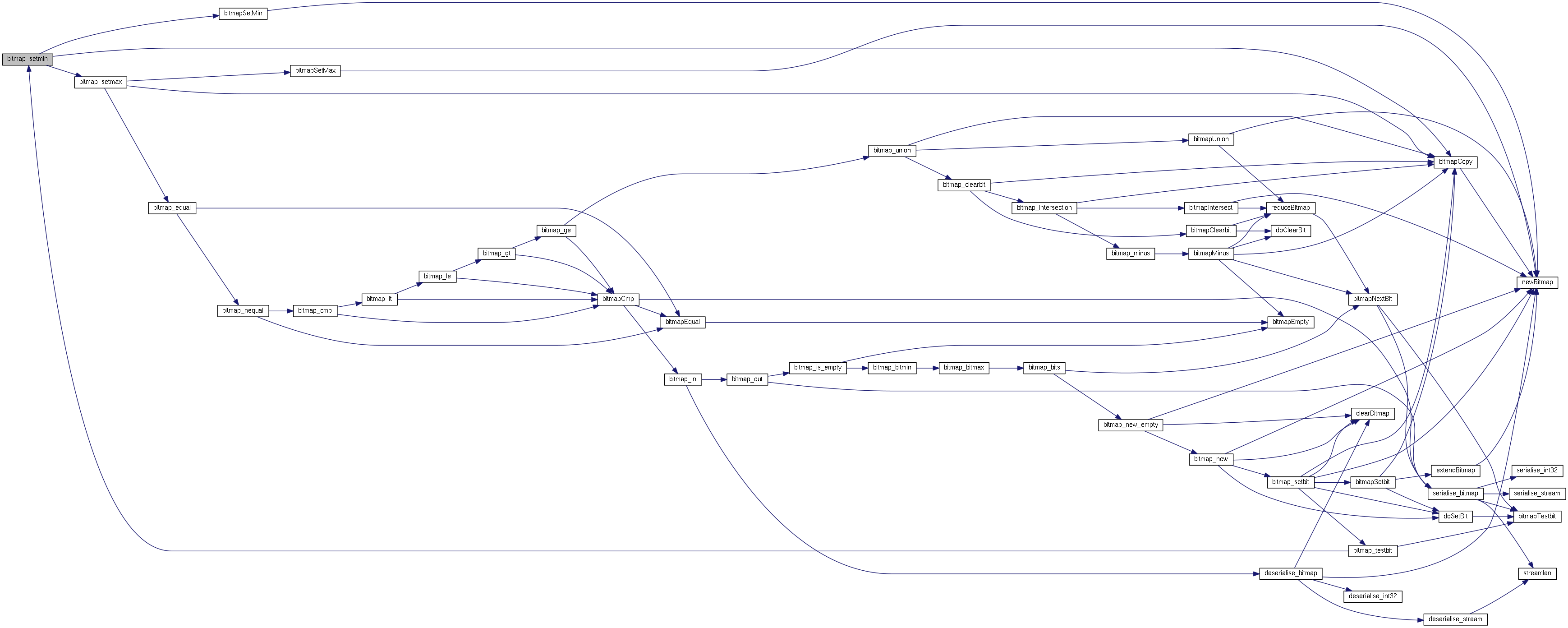
◆ bitmap_testbit()
| Datum bitmap_testbit | ( | FunctionCallInfo | fcinfo | ) |
bitmap_testbit(bitmap bitmap, bit int4) returns bool Test the given bit in the bitmap, returning TRUE if it is 1.
- Parameters
-
fcinfo Params as described_below
bitmap bitmapThe bitmap to be manipulated.
bitno int4The bitnumber to be tested.
- Returns
boolthe truth value of the bit.
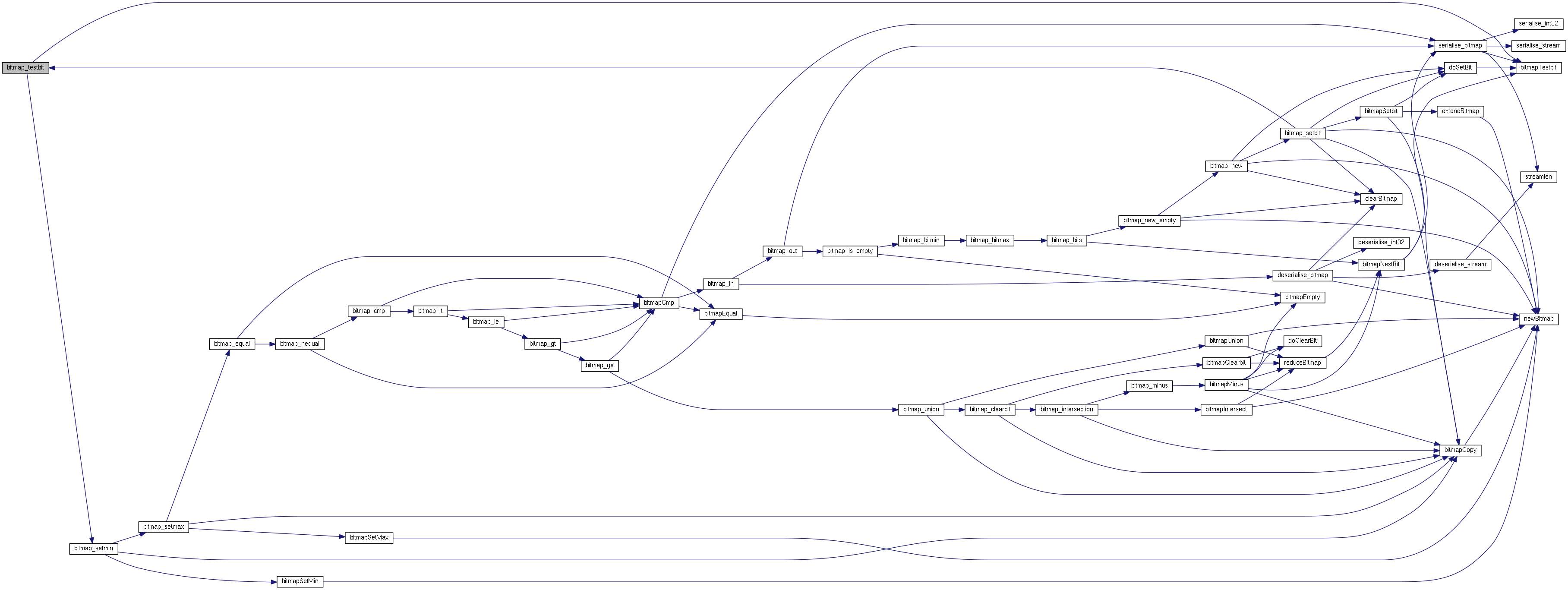
◆ bitmap_union()
| Datum bitmap_union | ( | FunctionCallInfo | fcinfo | ) |
bitmap_union(bitmap1 bitmap, bitmap2 bitmap) returns bitmap Return the union of 2 bitmaps. This can be used as an aggregate function in which case the bitmap1 parameter will be null for the first call. In this case simply return the second argument.
- Parameters
-
fcinfo Params as described_below
bitmap1 bitmapThe first bitmap
bitmap2 bitmapThe second bitmap
- Returns
bitmapthe union of the two bitmaps.

◆ bitmapClearbit()
◆ bitmapCmp()
◆ bitmapCopy()
Create a copy of a bitmap.
- Parameters
-
bitmap The original bitmap
- Returns
- Copy of bitmap.

◆ bitmapEmpty()
Predicate identifying whether the bitmap is empty. This takes a pretty simplistic view of what it means to be empty: any properly contructed non-empty bitmap will have bits set in at least the bitmin and bitmax positions,
- Parameters
-
bitmap The Bitmap being scanned.
- Returns
- True if the bit at bitmin is zero.
◆ bitmapEqual()
◆ bitmapIntersect()
◆ bitmapMinus()
◆ bitmapNextBit()
|
static |
Return the next set bit in the Bitmap.
- Parameters
-
bitmap The Bitmap being scanned. inbit The starting bit from which to scan the bitmap found Boolean that will be set to true when a set bit has been found.
- Returns
- The bit id of the found bit, or the inbit parameter if no set bits were found.
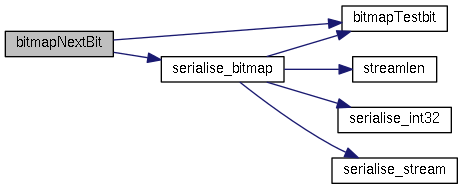
◆ bitmapSetbit()
◆ bitmapSetMax()
Ensure bitmax of bitmap is no more than parameter
- Parameters
-
bitmap The Bitmap to be modified bitmax The new minimum value
- Returns
- A newly allocated bitmap which has no higher bits than bitmax

◆ bitmapSetMin()
Ensure bitmin of bitmap is no less than parameter. This provides the means to quickly truncate a bitmap.
- Parameters
-
bitmap The Bitmap to be modified bitmin The new minimum value
- Returns
- A newly allocated bitmap which has no lower bits than bitmin

◆ bitmapTestbit()
| bool bitmapTestbit | ( | Bitmap * | bitmap, |
| int32 | bit | ||
| ) |
◆ bitmapUnion()
◆ clearBitmap()
|
static |
◆ deserialise_bitmap()
|
static |
De-serialise a bitmap.
- Parameters
-
charstream The serialised character string containing the bitmap.
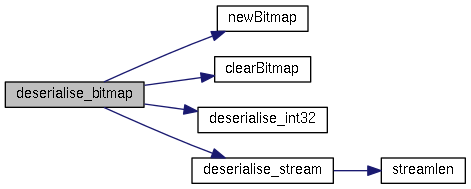
◆ deserialise_int32()
|
static |
De-serialise an int32 value from a base64 character stream.
- Parameters
-
p_stream Pointer into the stream currently being read. must be large enought to take the contents to be written. This pointer is updated to point to the next free slot in the stream after reading the int32 value.
- Returns
- the int32 value read from the stream
◆ deserialise_stream()
|
static |
De-serialise a binary stream.
- Parameters
-
p_stream Pointer into the stream currently being read. pointer is updated to point to the next free slot in the stream after reading the stream. bytes The number of bytes to be read outstream Pointer into the pre-allocated memory are into which the binary from p_stream is to be written.

◆ doClearBit()
|
static |
◆ doSetBit()
|
static |
◆ extendBitmap()
Take an existing bitmap, and return a larger copy that will be able to store a specified bit.
- Parameters
-
bitmap The original bitmap bit A new bit that the returned bitmap must be capable of storing.
- Returns
- New bitmap with appropriate bitmin and bitmax values.

◆ newBitmap()
|
static |
Return a new, possibly uninitialised, Bitmap.
- Parameters
-
min The lowest value bit to be stored in the bitmap max The highest value bit to be stored in the bitmap
- Returns
- New appropriately sized bitmap.
◆ reduceBitmap()
|
static |
◆ serialise_bitmap()
|
static |
Serialise a bitmap.
- Parameters
-
bitmap The bitmap to be serialised.
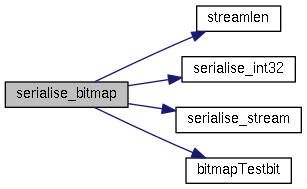
◆ serialise_int32()
|
static |
Serialise an int32 value as a base64 stream (truncated to save a byte) into *p_stream.
- Parameters
-
p_stream Pointer into stream currently being written. This must be large enought to take the contents to be written. This pointer is updated to point to the next free slot in the stream after writing the int32 value, and is null terminated at that position. value The value to be written to the stream.
◆ serialise_stream()
|
static |
Serialise a binary stream as a base64 stream into *p_stream.
- Parameters
-
p_stream Pointer into stream currently being written. This pointer is updated to point to the next free slot in the stream after writing the contents of instream and is null terminated at that position. bytes The number of bytes to be written. instream The binary stream to be written.
◆ streamlen()
|
static |
Return the length of a base64 encoded stream for a binary stream of ::bytes length.
- Parameters
-
bytes The length of the input binary stream in bytes
- Returns
- The length of the base64 character stream required to represent the input stream.
Variable Documentation
◆ _base64
|
static |
◆ b64lookup
|
static |
◆ bitmasks
|
static |
Array of bit positions for int64, indexed by bitno.





